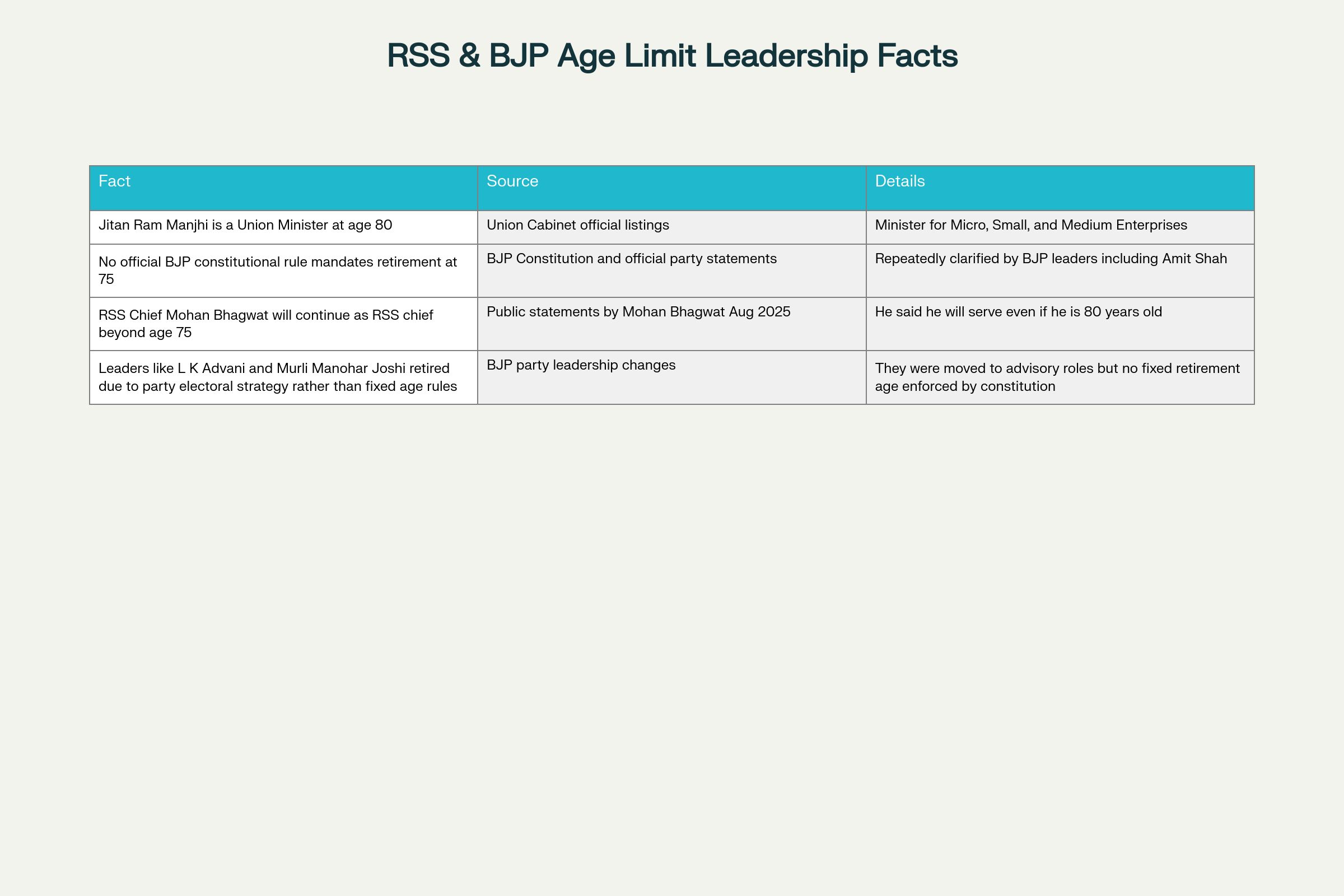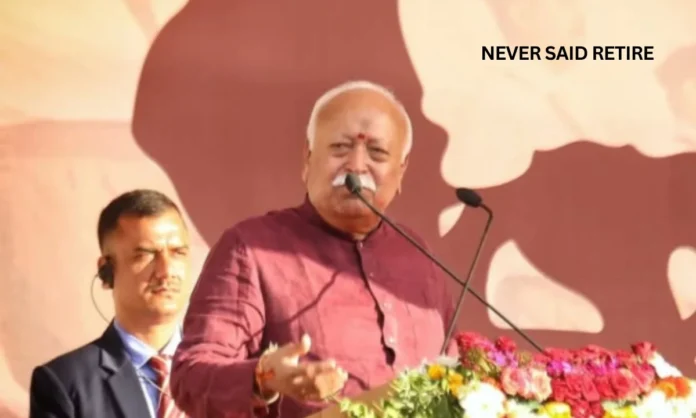Key Highlights:
- RSS Chief Mohan Bhagwat Clarifies No 75-Year Retirement Rule for Political Leadership Mohan Bhagwat unequivocally denied ever stating that anyone holding constitutional positions should retire at 75, directly addressing speculation about PM Modi’s retirement plans
- The BJP maintains no constitutional provision mandating retirement at 75, with Union Minister Jitan Ram Manjhi, 80, serving as active proof of this flexibility
- The RSS chief Mohan Bhagwat declared he would continue serving even beyond 80 years if asked by the organization, putting to rest questions about his own succession
The political landscape surrounding India’s leadership succession took a decisive turn as Rashtriya Swayamsevak Sangh RSS chief Mohan Bhagwat categorically dismissed speculation about a 75-year retirement age limit that many believed would affect Prime Minister Narendra Modi. Speaking at the RSS centenary celebrations, Bhagwat’s clear denial of any such rule has effectively ended months of political conjecture about retirement age in key positions across India’s ruling establishment.
Addressing reporters on August 28, 2025, Bhagwat stated unambiguously: “I never said I will retire or that someone else should retire when they turn 75”. This clarification came amid widespread speculation about Modi’s political future, as both leaders are set to turn 75 within days of each other in September 2025.
RSS Chief Mohan Bhagwat Refutes Age-Based Retirement Claims
- The RSS chief Mohan Bhagwat emphasized that constitutional positions are not governed by arbitrary age limits established by the organization
- Bhagwat declared his willingness to continue serving the RSS even if he reaches 80 years of age, underscoring the absence of mandatory retirement provisions
RSS Chief Mohan Bhagwat’s statement directly challenged interpretations of his earlier remarks made during a book launch in Nagpur, where he had suggested that 75 represents “nature’s signal to pause and give way to others”. The RSS chief Mohan Bhagwat clarified that these comments were misunderstood and not directed at any specific individual in constitutional office.
The timing of this clarification proved significant, as opposition parties had repeatedly referenced the supposed 75-year rule to question Modi’s continuation as Prime Minister beyond September 2025. Bhagwat’s definitive statement removes this political ammunition and reinforces the RSS position that leadership decisions remain separate from age-based criteria.
Speaking during the centenary celebrations, Bhagwat emphasized the RSS organizational structure: “In the Sangh, we are swayamsevaks… we are given a job, whether we want it or not”. He further stated: “We do whatever we are told to do,” indicating that service continues based on organizational needs rather than personal age considerations.
The RSS chief Mohan Bhagwat‘s clarification extends beyond personal retirement plans to encompass broader leadership principles within the organization. His statement that he would “continue to run the RSS even if I am 80 years old” establishes a clear precedent that age alone does not determine fitness for constitutional or organizational leadership roles.
BJP Reinforces Absence of Constitutional Age Restrictions
- Union Minister Jitan Ram Manjhi, aged 80, currently serves in Modi’s cabinet, demonstrating the party’s practical flexibility on age limits
- Home Minister Amit Shah has repeatedly clarified that the BJP constitution contains no provision requiring retirement at 75 years
The Bharatiya Janata Party has consistently maintained that no formal rule exists mandating retirement at 75 years of age for party leaders or those holding constitutional positions. This position gains concrete validation through the continued service of Union Minister Jitan Ram Manjhi, who at 80 years serves as Minister for Micro, Small, and Medium Enterprises in the current government.
BJP leadership has addressed the retirement age speculation multiple times, with Home Minister Amit Shah leading efforts to clarify the party’s position. In May 2024, Shah explicitly stated: “There is no provision regarding age, anywhere in the Constitution of the BJP”. These clarifications have been reinforced through practical appointments and continuances in government positions.
The party’s approach to age and leadership appears guided by electoral strategy rather than rigid rules. While senior leaders like L.K. Advani and Murli Manohar Joshi were eased out of active electoral politics, the BJP maintains this was a strategic decision rather than the implementation of a constitutional age limit.
This flexible approach allows the party to balance experience with renewal while avoiding arbitrary restrictions that might remove effective leaders solely based on age considerations. The presence of Manjhi in the cabinet serves as tangible evidence of this pragmatic approach to leadership positions.
Opposition Criticism and Political Implications of Age-Based Leadership
- Shiv Sena leader Sanjay Raut and other opposition figures have consistently raised questions about Modi’s adherence to the supposed 75-year rule
- Congress leaders have criticized what they perceive as double standards in applying age-related retirement policies
Opposition parties have repeatedly attempted to leverage the perceived 75-year retirement rule as a political weapon against Modi and the BJP. Shiv Sena leader Sanjay Raut has been particularly vocal, suggesting that Modi’s March 2025 visit to RSS headquarters in Nagpur was related to succession planning discussions.
Raut’s claims that “Modi’s successor will be from Maharashtra” and that “the RSS will decide on that” have been met with swift rebuttals from BJP leaders. Maharashtra Chief Minister Devendra Fadnavis responded firmly, stating: “In 2029 we will see Modi as Prime Minister again,” dismissing retirement speculation entirely.
Aam Aadmi Party leader Arvind Kejriwal has also attempted to capitalize on the age issue, suggesting during election campaigns that Modi would “retire next year” and that voters were effectively choosing Amit Shah as Prime Minister. These claims have been consistently countered by BJP leadership through both statements and continued governance activities.
The opposition’s strategy of questioning Modi’s continuation based on age considerations appears to have lost effectiveness following Bhagwat’s categorical denial of any such rule. The RSS chief Mohan Bhagwat’s clear statement removes a key talking point that opposition parties had hoped to use in future electoral campaigns.
RSS-BJP Relationship Dynamics and Organizational Autonomy
- Bhagwat emphasized that the RSS and BJP maintain separate decision-making processes, with the party autonomous in choosing its leadership
- The RSS chief Mohan Bhagwat dismissed speculation about organizational friction, stating that both groups share common long-term objectives
The relationship between the RSS and BJP has been subjected to intense scrutiny, particularly regarding leadership decisions and succession planning. RSS Chief Mohan Bhagwat’s statements during the centenary celebrations provided crucial clarity on the boundaries between organizational influence and party autonomy.
Speaking about leadership decisions, RSS chief Mohan Bhagwat emphasized that “it is the Bharatiya Janata Party, not the Sangh, that decides its leadership”. This distinction reinforces the separate operational spheres of the two organizations while acknowledging their ideological alignment and shared objectives.
The RSS chief Mohan Bhagwat addressed speculation about organizational friction by stating: “The goals of both organisations are the same. There may be struggle, but there is no quarrel”. This formulation acknowledges potential differences in approach while emphasizing underlying unity of purpose between the RSS and its political counterpart.
RSS chief Mohan Bhagwat’s clarification about the BJP’s search for a new party president further illustrates this autonomy. When asked about RSS involvement in the selection process, he stated: “It wouldn’t have taken this (much) time to decide” if the RSS were directly involved. This response both distances the RSS from the decision and subtly prods the BJP to conclude its leadership selection process.
The organizational relationship remains characterized by coordination rather than direct control, with both entities maintaining distinct roles within the broader framework of their shared ideological vision.

Official Verified Data Points on RSS and BJP Leadership Age and Retirement
Final Assessment on Leadership Continuity and Age Considerations
RSS Chief Mohan Bhagwat’s unambiguous clarification regarding the absence of a 75-year retirement rule effectively resolves months of political speculation and opposition maneuvering around Modi’s continuation as Prime Minister. The RSS chief Mohan Bhagwat’s statement that he “never said someone holding a constitutional post should retire at 75” removes the ideological foundation that opposition parties had hoped to exploit in questioning the Prime Minister’s tenure beyond September 2025.
The practical evidence supporting this position includes the continued service of Union Minister Jitan Ram Manjhi at age 80, demonstrating the government’s flexible approach to age and leadership roles. Combined with repeated clarifications from BJP leadership about the absence of constitutional age restrictions, the political narrative around mandatory retirement at 75 appears definitively settled.
This clarification strengthens Modi’s position for potential continuation beyond his 75th birthday while reinforcing the RSS’s role as an ideological guide rather than a direct controller of political succession decisions. The distinction between organizational service, as exemplified by RSS chief Mohan Bhagwat’s commitment to continue even at 80, and political leadership decisions remains clearly delineated, ensuring both continuity and appropriate institutional boundaries in India’s governing framework.


